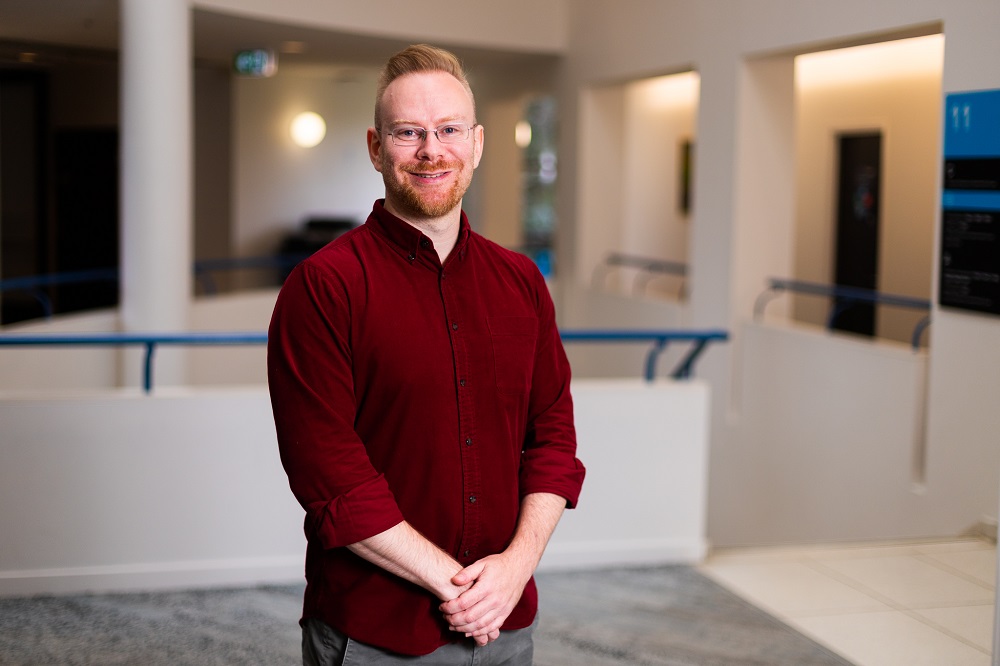Emma Larouche
6 February 2023: University of Canberra Postdoctoral Fellow Dr Hans Asenbaum has received the ECPR Rising Star Award, recognising his achievements as an early career researcher.
The award is presented annually, through the European Consortium for Political Research (ECPR) – the leading European academic association, of which the University of Canberra is a member institution, with a mission to advance political science – providing recipients with the opportunity to develop their networks and skills in the field of politics and international relations.
“For me, the award shows that critical voices are important, are heard and are appreciated in our society – I've always tried to make a case for inclusion and for sensitivity to our identities,” Dr Asenbaum said.

The research agenda of identities, discrimination, and inclusion is the topic of Dr Asenbaum’s new book The Politics of Becoming: Anonymity and Democracy in the Digital Age, which is going to be published by Oxford University Press in March.
“Society expects us to express our identities in coherent and continuous ways – we are perceived as a certain person, and this is quite limiting,” Dr Asenbaum said. “But inside, we are so much more. We are so many things. The Politics of Becoming is about setting free our inner multiplicity. Defying identity confinements can enable democratic transformations.”
How to make democracy more inclusive is also the focus of his current research agenda, after the book. He raises the question of how to share philosophical ideas with a wider audience, outside academia.
“I've noticed that the way we produce democratic theory is often quite exclusive. We come up withphilosophical ideas in the academic ‘ivory tower’ and people outside academia may not understand or engage with these ideas,” he said.
“In my work, I seek to theorise what democracy means along with social movements and with people outside academia – I pursue conversations with the actors involved in the movements and include materials published by the movements, creating democratic theory in a more democratic way.”
This work translates into both Dr Asenbaum’s democracy research and his teaching at the Centre for Deliberative Democracy and Global Governance, a world-leading research centre within the University of Canberra’s Faculty of Business, Government and Law.
Dr Asenbaum has also been contributing to undergraduate teaching at the University over the past three years. This has been mainly online, due to COVID-19 restrictions.
“My research informs my approach to teaching. I always try to be very inclusive and creative with my teaching methods, in an effort to motivate the students,” he said.
“I also respect the students in a way that sees them as bearers of knowledge as well – they are the experts in their own lives, and I can always learn from them.”
Dr Asenbaum found the perfect environment for his research at the Centre for Deliberative Democracy and Global Governance.
“I’ve been working at the Centre for the past two and a half years with fantastic people, who are so eager and prolific, but at the same time modest,” he said.
“Academia can often feel stressful, but here, everything feels creative and productive.
“There are so many projects we're working on – the Centre is like a bubbling, boiling soup – with somebody saying, ‘I have this idea, let's do this, let's sit down, let's draft a paper, let's develop a new project’.”
Dr Asenbaum’s journey as a democracy researcher began as a PhD student at the University of Vienna.
“I was very lucky to have published quite early as a PhD student. I wrote an article in American Political Science Review, an esteemed political science journal,” he said.
Dr Asenbaum received a scholarship from the University of Westminster in London where he focused on democracy research for three years, before joining a research project at the Institute of Advanced Sustainability Studies in Potsdam, Germany for a year.
Through the ECPR Rising Star Award, he will also join workshops, conferences and other events, courtesy of the association.
“This is an incredibly valuable opportunity for an early career researcher like me, to share ideas and make new connections.”


